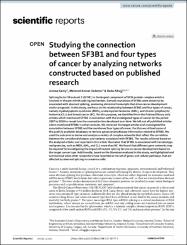| dc.contributor.author | Samy, Asmaa | |
| dc.contributor.author | Özdemir, Mehmet Kemal | |
| dc.contributor.author | Alhajj, Reda | |
| dc.date.accessioned | 2023-03-03T07:48:27Z | |
| dc.date.available | 2023-03-03T07:48:27Z | |
| dc.date.issued | 2023 | en_US |
| dc.identifier.citation | Samy, A., Özdemir, M. K. ve Alhajj, R. (2023). Studying the connection between SF3B1 and four types of cancer by analyzing networks constructed based on published research. Scientific Reports, 13(1). https://dx.doi.org/10.1038/s41598-023-29777-5 | en_US |
| dc.identifier.issn | 2045-2322 | |
| dc.identifier.uri | https://dx.doi.org/10.1038/s41598-023-29777-5 | |
| dc.identifier.uri | https://hdl.handle.net/20.500.12511/10561 | |
| dc.description.abstract | Splicing factor 3B subunit 1 (SF3B1) is the largest component of SF3b protein complex which is involved in the pre-mRNA splicing mechanism. Somatic mutations of SF3B1 were shown to be associated with aberrant splicing, producing abnormal transcripts that drive cancer development and/or prognosis. In this study, we focus on the relationship between SF3B1 and four types of cancer, namely myelodysplastic syndrome (MDS), acute myeloid leukemia (AML), and chronic lymphocytic leukemia (CLL) and breast cancer (BC). For this purpose, we identified from the Pubmed library only articles which mentioned SF3B1 in connection with the investigated types of cancer for the period 2007 to 2018 to reveal how the connection has developed over time. We left out all published articles which mentioned SF3B1 in other contexts. We retrieved the target articles and investigated the association between SF3B1 and the mentioned four types of cancer. For this we utilized some of the publicly available databases to retrieve gene/variant/disease information related to SF3B1. We used the outcome to derive and analyze a variety of complex networks that reflect the correlation between the considered diseases and variants associated with SF3B1. The results achieved based on the analyzed articles and reported in this article illustrated that SF3B1 is associated with hematologic malignancies, such as MDS, AML, and CLL more than BC. We found that different gene networks may be required for investigating the impact of mutant splicing factors on cancer development based on the target cancer type. Additionally, based on the literature analyzed in this study, we highlighted and summarized what other researchers have reported as the set of genes and cellular pathways that are affected by aberrant splicing in cancerous cells. | en_US |
| dc.language.iso | eng | en_US |
| dc.publisher | Nature Research | en_US |
| dc.rights | info:eu-repo/semantics/openAccess | en_US |
| dc.rights | Attribution 4.0 International | * |
| dc.rights.uri | https://creativecommons.org/licenses/by/4.0/ | * |
| dc.subject | SF3B1 | en_US |
| dc.subject | Cancer | en_US |
| dc.subject | Analyzing Networks | en_US |
| dc.title | Studying the connection between SF3B1 and four types of cancer by analyzing networks constructed based on published research | en_US |
| dc.type | article | en_US |
| dc.relation.ispartof | Scientific Reports | en_US |
| dc.department | İstanbul Medipol Üniversitesi, Mühendislik ve Doğa Bilimleri Fakültesi, Elektrik ve Elektronik Mühendisliği Bölümü | en_US |
| dc.authorid | 0000-0002-9054-0005 | en_US |
| dc.authorid | 0000-0001-6657-9738 | en_US |
| dc.identifier.volume | 13 | en_US |
| dc.identifier.issue | 1 | en_US |
| dc.relation.publicationcategory | Makale - Uluslararası Hakemli Dergi - Kurum Öğretim Elemanı | en_US |
| dc.identifier.doi | 10.1038/s41598-023-29777-5 | en_US |
| dc.institutionauthor | Samy, Asmaa | |
| dc.institutionauthor | Özdemir, Mehmet Kemal | |
| dc.institutionauthor | Alhajj, Reda | |
| dc.identifier.wosquality | Q2 | en_US |
| dc.identifier.wos | 001012758100049 | en_US |
| dc.identifier.scopus | 2-s2.0-85148114932 | en_US |
| dc.identifier.pmid | 36792691 | en_US |
| dc.identifier.scopusquality | Q1 | en_US |



















